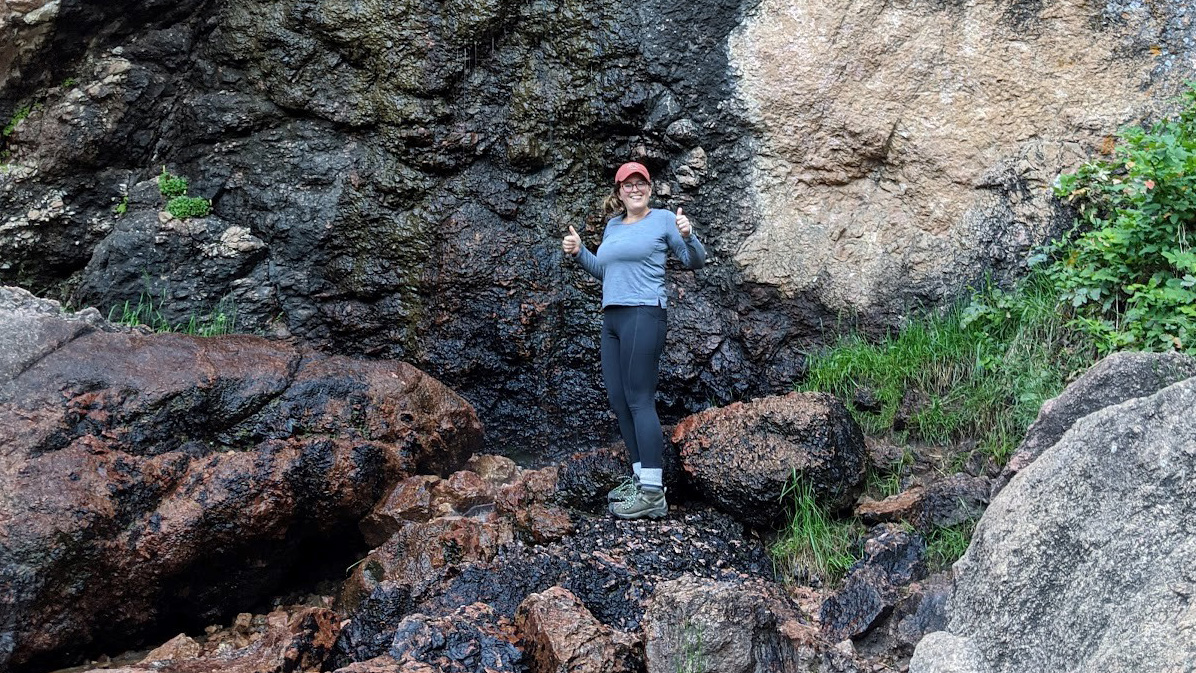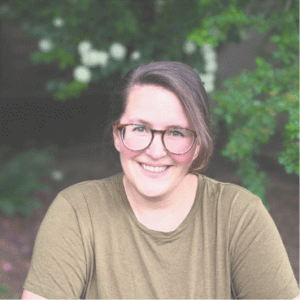
Outstanding occupational therapy Ph.D. graduate Hannah Burke learned the true definition of “mentors” during her time at Colorado State University. Like many students, Burke’s academic experience was greatly impacted by the COVID-19 pandemic and the challenges that came with it. From virtual classes to a virtual wedding, Burke leaned on her support systems to not just endure her obstacles but to overcome them and succeed and earn her degree.
Journey to CSU
Burke, originally from Portland, Oregon, earned her master’s degree in occupational therapy from the University of Illinois at Chicago. After graduating, she gained clinical experience in pediatrics before completing a pediatric Leadership Education in Neurodevelopmental and Related Disabilities fellowship at Oregon Health & Science University. During the fellowship, she collaborated with mentor and supervisor Kim Solondz, who encouraged Burke to initiate a research project aligned with her clinical work.
 The fellowship also marked the beginning of Burke’s involvement in nature-based occupational therapy, a passion that grew over time. Simultaneously, Burke collaborated with therapists at a nature-based camp for neurodivergent children in Australia – Camp Jabiru. Burke had the opportunity to work with occupational therapists Shelly Lane and Tracy Stackhouse on research related to the camp. These experiences solidified her decision to pursue a research doctorate, aiming to continue her work in the field.
The fellowship also marked the beginning of Burke’s involvement in nature-based occupational therapy, a passion that grew over time. Simultaneously, Burke collaborated with therapists at a nature-based camp for neurodivergent children in Australia – Camp Jabiru. Burke had the opportunity to work with occupational therapists Shelly Lane and Tracy Stackhouse on research related to the camp. These experiences solidified her decision to pursue a research doctorate, aiming to continue her work in the field.
Having previously worked with Lane at Newcastle University, the opportunity to continue under her guidance at CSU was a significant factor in Burke’s decision. Lane and renowned OT researcher Anita Bundy are both part of the Department of Occupational Therapy at CSU, ensuring that Burke could shape an educational program aligned with her career goals.
“I was excited about the Occupation and Rehabilitation Sciences Ph.D. that CSU offers,” said Burke, “but my main draw was definitely the incredible mentors in the program.”
A tight-knit team
Burke’s cohort of students faced the unfortunate circumstance of having only one semester together in person before the pandemic struck. The transition to remote learning presented a challenge for Burke, who had moved away from her family for school. The situation was compounded by the inability to visit them. The challenge extended to her personal life, including the transition to planning and executing a remote wedding.
Despite these obstacles, and a slight pivot in her dissertation research, Burke persevered. “I give all credit to my incredible professional and personal support networks that made the hard work of completing a dissertation completely manageable, even under these circumstances,” she said. Burke acknowledges that her dissertation journey would not have been possible without the unwavering support of Lane and Bundy.
“Throughout my time in the program, Dr. Lane gave me incredible opportunities to collaborate on research with her and her colleagues and to generally be involved in projects that felt meaningful,” said Burke. “She has a great knack for offering the perfect amount of guidance – giving independence along with the right amount of support. I also was lucky to have Dr. Bundy as a committee member and additional adviser; she was a great resource for her artful and incisive thinking – she really helped to elevate my research.”
Additional professors in the Department of Occupational Therapy, including Pat Sample, Patricia Davies, and Karen Atler, played pivotal roles in helping Burke develop her philosophy of research and teaching. Each of them served as an important mentor, expanding her understanding of research, and guiding the development of a teaching pedagogy aligned with her values.
Burke also expressed gratitude to Jill Zarestky, faculty member in the School of Education, who facilitated an interdisciplinary qualitative research course, creating a community experience during the challenges of transitioning to entirely remote courses during the pandemic. “That was a complete surprise and highlight of my education,” she said.
“The enthusiasm each of these advisors and educators have, as well as the collegial spirit they applied to our interactions, was really motivating and supportive,” said Burke.
Dissertation research
With her multitude of research interests, narrowing down to a single topic initially proved challenging for Burke. Eventually, her dissertation focused on the exploration of how essential professional thinking skills are conceptualized and taught within occupational therapy.
The core of her research revolved around reflective practice and its interplay with professional reasoning and evidence-based practice – abstract yet crucial aspects within the profession. Burke delved into literature definitions and relationships among these constructs. She also sought perspectives from occupational therapy educators. The outcome of her research includes proposed models illustrating the interaction of these constructs, with the aim of advancing the discourse on professional thinking in occupational therapy.
“I am also excited about how this deep dive into reflective practice has elevated my own thinking around how to advance emerging practice areas like pediatric, nature-based occupational therapy,” added Burke.
Through her research, she hopes to contribute to the ongoing conversation and development in the field.
Next steps
Burke will miss the collaborative environment with her colleagues and the opportunity to pursue her educational interests. But, the experiences and connections cultivated during her academic journey serve as valuable assets as she transitions into the next phase of her professional life.
Burke is enthusiastic about crafting a career that seamlessly integrates the interests she cultivated during her Ph.D. program. Currently, she is supporting a non-profit interdisciplinary therapy clinic by contributing to program evaluation and enhancing reflective practice. In addition, she has taken on the role of adjunct teaching in occupational therapy, focusing on pediatrics and evidence-based practice. Burke also dedicates time to clinical work, ensuring she stays grounded and actively involved in professional practice. This multifaceted approach to her career is proving to be a rewarding and harmonious blend of her diverse interests and skills.
The Department of Occupational Therapy is a part of CSU’s College of Health and Human Sciences.